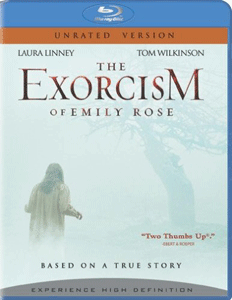“The Exorcism of Emily Rose” (2005) makes many lists of elite exorcism films, but in broader circles it’s under the radar. It gets lost in the shuffle of its subgenre; indeed, two “Exorcist” prequels came out in 2004-05. But this breakthrough film in the career of writer-director Scott Derrickson received renewed attention this summer with the release of his “The Black Phone.”
Fascinating legal issues
This is a richer combination of character drama and supernatural spookiness than the minimalist “Black Phone.” Derrickson and co-writer Paul Harris Boardman use a courtroom drama template. The state is trying Father Moore (Tom Wilkinson) for negligent homicide in the death of teenager Emily Rose (Jennifer Carpenter).
The film gets at juicy issues such as whether there is room for God in the courtroom, whether a patient (or her family) has the right to choose faith-based treatment, and whether accepted medicine of the day should be treated as gospel if the Gospel itself isn’t treated as gospel.

“The Exorcism of Emily Rose” (2005)
Director: Scott Derrickson
Writers: Paul Harris Boardman, Scott Derrickson
Stars: Laura Linney, Tom Wilkinson, Campbell Scott
Most intriguingly, it probes whether a spiritual argument can be approached scientifically. Shohreh Aghdashloo, breaking through in “24” the same year, plays Dr. Adani in a fascinating monolog from the witness stand. I wish we would’ve gotten more of this angle.
A more balanced look at both sides of the argument might’ve been interesting, too. But like “The X-Files,” it’s an open secret here that those who believe in the supernatural are not only the good guys, but also that they are correct.
Moving to modern times
“Emily Rose” is based on a true story from 1970s Germany. But Derrickson modernizes it so we can’t use the passage of time as a buffer. He’d use this reality/supernatural juxtaposition to even better effect in “Sinister.”
Defense lawyer Erin Bruner (Laura Linney) is a 21st century American career climber, as is her opponent, state prosecutor Ethan Thomas (Campbell Scott). Their legal battle is gripping both because of the material and the lawyers, who compete with professionalism and a tinge of animosity.
The events challenge Bruner’s agnosticism, and Thomas’ professed faith — only lightly in his case. The film could’ve done more with Bruner’s spiritual conflict on an intellectual level, but her middle-of-the-night creep-outs certainly have a vibe.
But “Emily Rose’s” under-writing of the lawyers is purposeful so it can focus on its titular victim, who we see possessed by a demon in flashbacks. Indeed, Moore’s main goal is not to free himself, but rather to tell Emily’s story. He insists Bruner let him take the stand, even if it’s not ideal legal strategy.
Carpenter’s slightly unorthodox facial features (by Hollywood standards) combine with contortionist skills (or those of her stunt person) to make us uneasy around Emily (or the demon controlling her body) even as we sympathize. Scares in the flashbacks hinge on Emily being frozen in an unnatural position — one shot made me flinch — and the sound department adds creepy vocal emanations.
Soaked in mood
Derrickson, cinematographer Tom Hern and composer Christopher Young give us plenty of mood to soak up. The film opens at a snowy farm house with a doctor (Duncan Fraser) looking up at a second-story bedroom where the exorcism will happen. That camera angle is a nod to “The Exorcist’s” streetlamp image. But while the moodiness piles up, Derrickson goes for more consistently intense scares than “The Exorcist.”
Most strikingly, Emily – in the throes of possession – awkwardly runs through her college campus pathways in a nighttime rainstorm. Illuminated by sidewalk lamps and indoor building lights, she passes shocked onlookers.
It’s a mild flaw of the film that we always know Emily is possessed; a twist of a rational answer is never a possibility. That rainstorm sequence, with its two alternating viewpoints, mildly hints that Emily is clinically psychotic (the state’s theory), but not enough for us to believe it.
As such, the jury looks dumb for even considering that Emily might not have been possessed. Granted, they only hear an audiotape of the demon speaking from her mouth; they don’t see it visually like we do. Still, Derrickson overplays his hand, leading to one of those verdicts where you hate the jury. On the other hand, after the verdict we get a redeeming twist, which is a fictionalized add-on.
“The Exorcism of Emily Rose” doesn’t draw outside the lines of courtroom drama or possession horror. But the combination of the two is rare, and both genres feed off each other, leading to consistent mood and narrative momentum. This film rightly put Derrickson on the map.


